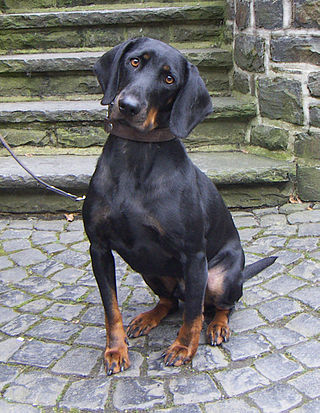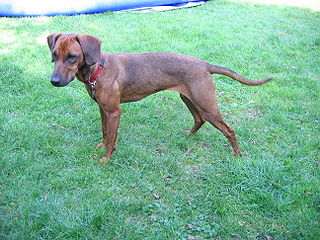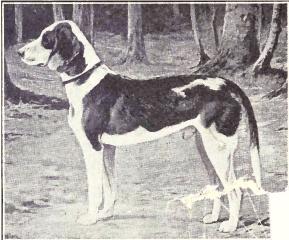
Scent hounds are a type of hound that primarily hunts by scent rather than sight. These breeds are hunting dogs and are generally regarded as having some of the most sensitive noses among dogs. Scent hounds specialize in following scent or smells. Most of them tend to have long, drooping ears and large nasal cavities to enhance smell sensitivity. They need to have relatively high endurance to be able to keep track of scent over long distances and rough terrain. It is believed that they were first bred by the Celts by crossbreeding mastiff-type dogs with sighthounds. The first established scent hounds were St. Hubert Hounds bred by monks in Belgium during the Middle Ages.

Griffon is a type of dog, a collection of breeds that were originally hunting dogs. There are three lines of the griffon type recognized by the Fédération Cynologique Internationale (FCI): the Griffon Vendéens, the wirehaired pointers, and the smousje. The griffon type is characterized by rough- or wire-hair.

The Alpine Dachsbracke is a small breed of dog of the scent hound type originating in Austria. The Alpine Dachsbracke was bred to track wounded deer as well as boar, hare, and fox. It is highly efficient at following a trail even after it has gone cold. The Alpine Dachsbracke is very sturdy.

The Hamiltonstövare is a breed of scenthound originally developed by the founder of the Swedish Kennel Club, Count Adolf Hamilton. Its ancestors include several German hounds as well as English Foxhounds and Harriers. The breed is recognized by the Swedish Kennel Club, Federation Cynologique Internationale (FCI) and the American Kennel Club's Foundational Stock Service.

The Austrian Black and Tan Hound is a medium sized scenthound originating in Austria and is used for tracking wounded game, most commonly hare, in high altitudes.

The Tyrolean Hound is a breed of dog that originated in Tyrol also called the Tiroler Bracke or Tyroler Bracke. They are scent hounds that descended from the Celtic hounds in the late 1800s, mainly for their hunting skills. They are hardworking, passionate, and independent dogs not known for their size, but rather their intelligence. For that reason, hunters can regularly use these dogs to catch their prey, wounded or otherwise. Their ability to stretch over long distances, on rough hot or cold terrain for their prey is also another perk of keeping this dog by your side. Hunters do have to worry about injuries to their dog, however, along with the common injuries that these dogs obtain throughout their life, like hip dysplasia or ear infections. Barring any injuries, these dogs tend to live an energetic life for about 12-14 years, and tend to be an overall healthy and robust dog.

The Barak or Bosnian Broken-haired Hound, is a hunting dog breed developed in Bosnia. The breed is a scenthound, originally used to hunt large game. Other names include Bosnian Rough-haired Hound and Bosnian Rough-coated Hound. These names refer to the texture of the shaggy coat, usually called broken-haired or hard in English dog fancier jargon.

The Grand Anglo-Francais Tricolore is a breed of dog used in hunting as a scenthound, usually in packs. It is one of the Anglo-French hound breeds which were created by crossing French scenthounds with English (Anglo) Foxhounds.

The Drever is a breed of dog, a short-legged scenthound from Sweden used for hunting deer and other game. The Drever is descended from the Westphalian Dachsbracke, a type of German hound called Bracke. The breed name Drever was chosen through a contest in 1947.

The Transylvanian Hound, also known as the Transylvanian Scent Hound or Hungarian Hound, is a Hungarian breed of scent hound used primarily for hunting. It originated in the former Kingdom of Hungary in the historical region of Transylvania, which is now part of Romania. It is strong and of medium size, characterized by a black body with tan and sometimes white markings on the muzzle, chest and extremities, and distinctive tan eyebrow spots. It has a high-pitched bark for a dog of its size. The breed was rescued from extinction by focused breeding efforts in the late twentieth century. There were formerly two varieties, the tall and the short, developed for different kinds of hunting in the Middle Ages. Only the tall variety survives today.

The Finnish Hound is a breed of dog originally bred for hunting hare and fox.

The Westphalian Dachsbracke is a small, short-legged scenthound, a breed of dog originating in Westphalia, a region of Germany. The Westphalian Dachsbracke was used in Sweden to develop the Drever.

The Slovenský kopov is a medium-sized breed of hunting dog of the scenthound type. The breed originated in Slovakia, in Central Europe, and is bred for deer tracking and boar hunting. The name Black Forest Hound seems to have been created in North America for marketing purposes, since the breed has no connection with the Black Forest. The German name for this breed is Schwarzwildbracke which translates to Wild Boar Hound and not Schwarzwaldbracke which would be Black Forest Hound.

The Grand Anglo-Français Blanc et Noir translated into English as the Great Anglo-French White and Black Hound, is a breed of dog used in hunting as a scenthound, usually in packs. It is one of the Anglo-French hound breeds which were created by crossing French scenthounds with English (Anglo) Foxhounds.

The Grand Anglo-Français Blanc et Orange translated into English as the Great Anglo-French White and Orange Hound, is a breed of dog used in hunting as a scenthound, usually in packs. It is one of the Anglo-French hound breeds which were created by crossing French scenthounds with English (Anglo) foxhounds.

The Sabueso Español or Spanish Hound is a scenthound breed with its origin in the far north of Iberian Peninsula. This breed has been used in this mountainous region since hundreds of years ago for all kind of game: wild boar, hare, brown bear, wolf, red deer, fox, roe deer and chamois. It is an exclusive working breed, employed in hunting with firearms.

The Posavac Hound is a breed of dog, originating as a hunting dog of the scenthound type. Croatia is the home country for the breed. The name translates into English as the Scenthound From The Sava Valley, but is usually translated as the Posavac Hound.

The Istrian Short-haired Hound is a breed of dog from Istria in Croatia, descended from a very old type of scenthound. This hound is the slightly smaller counterpart to the longer-coated Istrian Coarse-haired Hound from the same region.

The German Hound is a breed of dog originating in Westphalia, a region of Germany. The German Hound is of the scenthound type, used for hunting both large and small game.

The Greek Harehound is a rare breed of dog that only comes in a black and tan color, originally bred as a scenthound for tracking and chasing hare in Southern Greece.



















